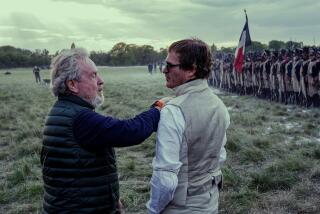Seven Westerns From Now, Will He Care?
NEW YORK — “Do you think,” I asked a colleague the other day, “that my 10-year-old son would appreciate being taken along to see ‘Seven Men From Now’?”
“Depends on whether you raised him right,” was the reply coming from a wry, dry corner of the colleague’s mouth.
Which is the sort of answer I deserved--probably the sort of answer that I would have gotten from Randolph Scott himself.
Released in 1956, “Seven Men From Now” was the first of seven “B” westerns directed by Budd Boetticher and starring Scott (1903-87) that were released over the next four years. After years of neglect, physical and otherwise, the film was recently given a shiny-fresh revival at UCLA and at the New York Film Festival.
My son doesn’t know from westerns. Not many of his friends do, either. Being 10 isn’t what it used to be. As a child, I encountered these films by chance, either as openers for drive-in double features or as Saturday afternoon TV fodder interrupted by ads for discount warehouses and chocolate milk. In these digital days of Pokemon, Dragonball-Z and every afternoon “Toon-ami” slugfest my son can absorb, the leathery stoicism of a Randolph Scott seems more than quaint. It seems unreachably, unimaginably prehistoric.
*
So, given the present culture, I don’t know whether “raising my son right” makes much of a difference whether he is open to the wide-open spaces and gritty grandeur of a Boetticher western.
Then again, I’m not sure I really appreciated them when I was his age. All I knew about these movies was that they were Randolph Scott westerns. What that meant, if I recollect correctly, was that Scott would always play this old hard case just on the sunny side of grizzled, forced to match wits and bullets with some younger, meaner hard case who--how do they always put it?--grudgingly admired the Scott character enough to want to hold off on killing him. Of course, the Scott character ends up doing what he had to do with few regrets and fewer words.
To my 10- or 11-year-old self, the Scott movies were swift, efficient entertainments. But I couldn’t make any distinctions back then between, say, “Seven Men From Now” and “Buchanan Rides Alone” (1959) or “The Tall T” (1957), which even then was my favorite because the late, irreplaceable Richard Boone--my man Paladin from “Have Gun Will Travel”--was Scott’s grudging admirer-antagonist-sociopath. (Lee Marvin, for what it’s worth, has that role in “Seven Men.”) To a kid like me who loved the soft hum and sunny sprawl of the postwar movie western for its own sake, the Boetticher-Scott collaborations may as well have been the same movie with the same rituals, same tensions, same outcome.
Older now, I recognize that such thinking was both right and wrong. Yes, the Boetticher stories, many of which were written by veteran western writer Burt Kennedy, had a ritualized quality of mano a mano battles. Boetticher, still alive and well at 84, was once a bullfighter, and he carried his duel-in-the-sun aesthetics with him throughout his career.
But passage through one’s 20s, 30s and 40s makes one far more attentive to the cunning psychological spins applied to traditional western archetypes in these films. Seeing “The Tall T” after several years, I was struck by undertones of melancholy and crabbiness that seem especially endemic to the middle-aged. Scott’s Pat Brennan is a proud but lonely rancher who doesn’t seem to mind tending goats--until some insolent young “ramrod” (someone who can “break” wild horses and bulls) starts taunting him about it.
Scott, who was in his mid- to late 40s when these movies were made, shows surprising delicacy in injecting this stubborn, somewhat petty resentment without shortchanging his character’s basic nobility and command. Talk about a man “knowing his limitations.” Makes me wonder whether I’ve raised myself well enough to understand these films.
More to Read
Only good movies
Get the Indie Focus newsletter, Mark Olsen's weekly guide to the world of cinema.
You may occasionally receive promotional content from the Los Angeles Times.









